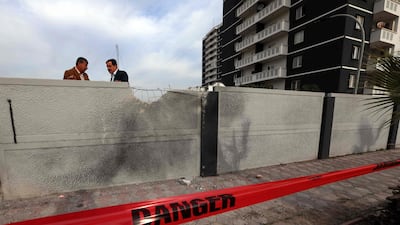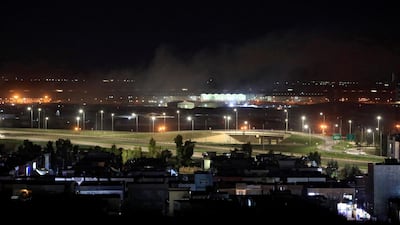The US is considering its options and helping with investigations after a 14-rocket attack on a US airbase in the Kurdish region of Iraq killed a contractor and injured a services member.
The attack, which took place about 9.30pm local time on Monday, was claimed by a group calling itself Saraya Awliya Al Dam.
It pledged revenge against US forces for the killing of Iranian Quds Force leader Qassem Suleimani and Iraqi militia leader Abu Mahdi Al Muhandis in January 2020.
The US-led coalition confirmed 10 casualties and said five US citizens suffered concussion in the attack.
The 107-millimetre rockets used in the attack are believed to have been made in Iran.
The strike bore similarities to other attacks on US interests in Iraq, including a salvo of 21 rockets into Baghdad's Green Zone in December.
Former US president Donald Trump blamed Iran for that attack and told Tehran there would be a harsh response if any American were killed.
But President Joe Biden's team is pursuing a different approach to the Erbil attack.
Mr Biden was briefed on the incident, a White House official said, and US Secretary of State Antony Blinken avoided assigning blame or naming a group responsible for the attack.
State Department spokesman Ned Price said it was “premature to talk about retaliation”.
Mr Price said the US was “supporting our Iraqi partners in their efforts to investigate … and reserves the right to respond at a time and place of our choosing".
On Tuesday, US Defence Secretary Lloyd Austin called his Iraqi equivalent, Jumaah Saadoon, to offer condemnation and condolences after the attack.
“The Iraqi people deserve a secure and stable Iraq, and the United States remains committed to supporting our Iraqi partners in their efforts to defend Iraq’s sovereignty,” the Pentagon said.
Mr Blinken also called Masrour Barzani, the head of the Kurdish Regional Government, and “agreed to co-ordinate closely in the investigation to identify the outlaws behind it”.
Analysts and a Pentagon official consider Iran to be responsible the attack.
They expect a more covert response from the Biden administration than that of Mr Trump, which would draw a line while securing US interests.
A US defence official said the attack had the “hallmark of Iranian tactics in Iraq”, with the use of Iranian-made rockets and “a front organisation” to carry out the operation.
Ranj Alaadin, a scholar on Iraq and a fellow at the Brookings Institution think tank in Washington, believed the Erbil attack was an attempt by Iran to test the Biden administration and increase influence in any negotiations.
"The Erbil attack and attacks in the Gulf since Mr Biden became president suggest Iran and its proxies will opt for escalation until they are presented with a credible threat of escalation from the Biden administration," Mr Alaadin told The National.
By doing so “it can hurt the US, its rivals in Iraq, and shape the contours of its forthcoming negotiations with Washington in one go, with no cost to the regime".
He said the assumption in Tehran was that the new Biden team “has a high tolerance for these attacks, even tolerance for attacks that directly or indirectly kill US citizens”.
“That's a perception the Biden team must quickly alter and it's one that Iran will continue to test with further rocket attacks, which will harm US strategic interests in Iraq, undermine US allies and result in further atrocities against civilians,” Mr Alaadin said.
Nicholas Heras, the director of government relations at US think tank the Institute of the Study of War, expected a covert response from the Biden administration.
“The attack against US forces in Erbil is a declaration from the Iran-linked Iraqi militias that US forces can be touched even in the Kurdistan region … that there is no stronghold for the Americans in Iraq,” Mr Heras said.
He considered the attack to be “the first real foreign policy test of the Biden administration” in the Middle East, but expected a measured response behind the scenes.
“We should expect the Biden administration to take a cautious, policy-action approach to this attack,” Mr Heras said.
Iran was eager for Washington to lift sanctions and return to the 2015 nuclear deal it signed with world powers, which Mr Trump abandoned in 2018.
The Biden administration has done neither and indicated that such a return could take a long time.
“The Biden team will likely send a strong signal to the Iranians behind the scenes that these attacks are unacceptable," Mr Heras said.
He said the US would begin quietly working to provide the Kurdistan Regional Government and the Iraqi administration of Prime Minister Mustafa Al Kadhimi with intelligence to arrest the perpetrators of the attack.
Mr Heras said Mr Blinken's response to the attack was a “perfect example of the Biden team's quiet but strategic approach to the Middle East”.










